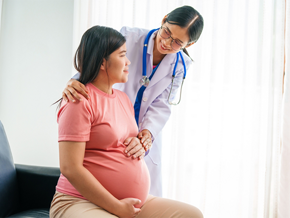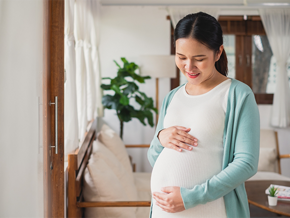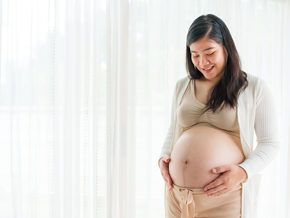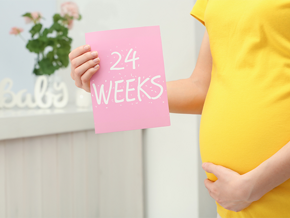
Are you waking up exhausted, even after a full night's sleep? Or does the thought of breakfast make your stomach churn? As uncomfortable as these feelings may be, these classic signs of being 7 weeks pregnant show your baby is growing at a remarkable pace, even if you're not showing yet.
Here’s what else to expect from your body and your baby this week. Plus, explore the best ways to care for yourself.
Your Baby's Development at 7 Weeks
Your little one is now about the size of an aratiles, measuring up to 1.2 cm, and their heart is beating between 120 and 160 times per minute. The American Pregnancy Association notes that doctors can often detect this heartbeat on an ultrasound after the 6-week mark.
The brain is growing at a remarkable rate
Your baby's brain is rapidly creating a large number of basic cells to form its main sections. The neural tube, which acts as the foundation for the spinal cord, supports this entire process of brain development.
Facial features and limbs are taking shape
The buds that will become arms and legs are growing longer—the hands and feet now look like small paddles! The first hints of facial features are also beginning to appear, including a mouth, nostrils, and the lenses of the eyes.
The digestive system is taking shape
This week, the foundation for your baby's entire digestive system is forming. According to the American College of Obstetricians and Gynecologists (ACOG), a long tube that will become the digestive tract is now forming and will eventually develop into your baby's stomach, liver, pancreas, and intestines.
Your Symptoms at 7 Weeks Pregnant

At 7 weeks pregnant, you may be feeling nauseated and have a strong aversion to your favorite food.
At 7 weeks pregnant, symptoms stem from a surge in pregnancy hormones called human chorionic gonadotropin (hCG).
Nausea and fatigue
Morning sickness, which can strike at any time of the day, is one of the most common complaints of women during early pregnancy. A 2025 systematic review in the journal Foods found that up to 85% of pregnant women experience nausea, which often begins between Weeks 4 and 7.
Hormonal changes and the immense energy your body uses to build the placenta cause both the nausea and fatigue you feel.
Breast tenderness and frequent urination
Your breasts may feel sore, swollen, or tender to the touch as they prepare for milk production. You may also find yourself visiting the restroom more frequently because hCG hormones, and your body’s increased blood volume make your kidneys filter waste much faster.
Cravings, aversions, and mood shifts
It's common to feel like your sense of smell is in overdrive, triggering intense food cravings and aversions. Interestingly, a systematic review in Chemical Senses suggests that hormones associated with pregnancy may alter how the brain processes smells. This may explain why you suddenly don't like your favorite food anymore or why a passing scent can instantly shift your mood.
Light cramping or spotting
Seeing any spotting at 7 weeks pregnant can be worrying, but it’s pretty common during this early stage. A 2025 study in the Journal of International Medical Research notes that vaginal bleeding happens most often in the first trimester. Usually, light spotting is due to the embryo implanting into the uterine wall.
While it can be a typical sign for many, call your doctor to let them know what's happening and for your peace of mind.
Your Nutrition Checklist This Week

To manage nausea, try eating bananas since they’re gentle on the stomach and rich in vitamin B6.
At 7 weeks pregnant, the food to eat should be nutrient-dense choices based on the Food and Nutrition Research Institute’s (FNRI) Philippine Dietary Reference Intakes (PDRI).
- Eat foods rich in folic acid from leafy greens, like malunggay, to support your baby's neural tube development.
- Get iron from lean meats and beans to help support your increasing blood production.
- Include calcium from dairy or small fish, like dilis, for your baby's developing bones and teeth.
- Try foods rich in vitamin B6, such as bananas, to help alleviate feelings of nausea.
- Have a small snack every two to three hours to help manage morning sickness and maintain stable blood sugar levels.
- Avoid raw meat and eggs, unpasteurized dairy, and high-mercury fish to keep your baby safe.
- Drink plenty of water throughout the day to stay hydrated and help reduce fatigue.
While getting nutrients from food is essential, you can learn more about different vitamins for pregnant women. Consult with your doctor to determine which supplements can best support your needs.
Tips to Help You Through Week 7
Beyond nutrition, these simple self-care strategies can help you feel better.
- Combat fatigue by getting plenty of sleep at night and taking short naps during the day if you can.
- Stash plain crackers or nuts, like almonds and cashews, in your bag or by your bed to settle your stomach the moment nausea hits.
- Identify and steer clear of specific smells, such as perfumes or certain foods, that exacerbate your morning sickness.
- Ask your partner to help by managing strong-smelling foods, taking over certain chores, or assisting you in tracking symptoms.
- Schedule your first appointment with your doctor to confirm your pregnancy and begin your prenatal care.
- Journal, rest when needed, and talk to a trusted friend or support group to help manage the emotional ups and downs of the first trimester.
When You Should Call Your Doctor
Contact your doctor immediately if you experience any potential signs of pregnancy complications, such as:
- Heavy bleeding (soaking through a pad in an hour)
- Severe abdominal or shoulder pain
- High fever over 38°C (100.4°F)
- Painful urination
- Severe nausea and vomiting that prevent you from keeping any food or liquid down
Frequently Asked Questions
When will morning sickness end?
Morning sickness typically peaks around Week 9 to Week 11 and then begins to fade as you enter the second trimester. Many find their symptoms disappear completely between Week 12 and Week 14. This relief may be due to the hormone hCG, which levels off after the first trimester.
Is it okay not to feel pregnant at 7 weeks?
Yes. Every pregnancy is different. Some people experience strong symptoms immediately, while others have very few. A lack of symptoms is not a sign that something is wrong.
Can I still exercise at this stage?
For most, gentle exercise is safe and beneficial. Activities such as walking and swimming are good options. Always consult your doctor about safe exercises for pregnant women before starting or continuing a workout routine.
Being 7 weeks pregnant is just the beginning of an incredible journey. By understanding the changes in your body and how your baby is growing, you can feel more confident and prepared during your pregnancy.
Connect with other parents on the ParentTeam Moms and Dads Facebook group and share your experiences and questions about being 7 weeks pregnant!
References
American College of Obstetricians and Gynecologists. "How Your Fetus Grows During Pregnancy." Accessed July 28, 2025. https://www.acog.org/womens-health/faqs/how-your-fetus-grows-during-pregnancy
American College of Obstetricians and Gynecologists. "Nausea and Vomiting of Pregnancy: ACOG Practice Bulletin, Number 189." Reaffirmed 2024. https://www.acog.org/clinical/clinical-guidance/practice-bulletin/artic….
Mayo Clinic. "Fetal Development: The First Trimester." Mayo Clinic, March 18, 2025. https://www.mayoclinic.org/healthy-lifestyle/pregnancy-week-by-week/in-depth/prenatal-care/art-20045302
Nemours KidsHealth. "Pregnancy Calendar: Week 7." Accessed July 28, 2025. https://kidshealth.org/en/parents/week7.html
NHS. "Week 7." NHS Start for Life. Accessed July 28, 2025. https://www.nhs.uk/start-for-life/pregnancy/week-by-week-guide-to-pregnancy/1st-trimester/week-7/
Nola Diagnostics Ultrasound. "What to Expect During Your First-Trimester OB Ultrasound." Nola Diagnostics Ultrasound (blog), October 8, 2024. https://www.nolaultrasound.com/post/what-to-expect-during-your-first-trimester-ob-ultrasound
UBM Scans. "When Can You See Baby Heartbeat on Ultrasound?" UBM Scans (blog). Accessed July 28, 2025. https://ubmscans.com.au/blogs/when-can-you-see-baby-heartbeat-on-ultrasound/




























